5 great personal finance books by women
Here are five powerful and inspiring personal finance books by women.
Advertisement
Here are five powerful and inspiring personal finance books by women.

When it comes to money and personal finance, women are still too often at a disadvantage—and damn tired of it. These five rousing reads aim to change the status quo by helping women grow and protect their wealth. Whether you’re dealing with job loss, debt, divorce or, say, a global pandemic, these books will help you navigate whatever financial challenges life throws your way.
Penguin Random House Canada; hardcover $26.72, e-book $13.99
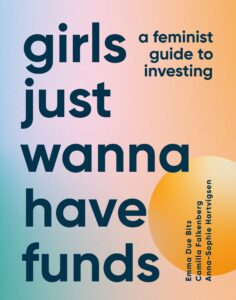
You’re probably familiar with age-old gender stereotypes like this one: Girls play with Barbies and boys play with Lego. But did you also know that young girls receive less allowance from their parents than boys do, or that girls are taught to do more chores? Even as we grow older, women receive lower-quality financial advice than men, and we’re encouraged to save rather than to invest.
There are tons of figures that illustrate gender-and-money issues, from the pay gap to the lack of women in executive and board positions. But the founders of global education platform Female Invest—Camilla Falkenberg, Emma Due Bitz and Anna-Sophie Hartvigsen—want women everywhere to change these statistics by learning how to grow their wealth.
In their new book, Girls Just Wanna Have Funds, the trio walks readers through the three stages of financial empowerment: prepare, invest and grow. Part one breaks down how to organize your finances, including how much of your income should go to necessities, fun and “future you” (your savings and investments). Part two explains investing in simple terms, defining stocks and other investments like ETFs and mutual funds. Calculations are included to help you make investing decisions. The authors also sprinkle in personal stories from women with diverse backgrounds and perspectives on money.
If you want to learn more about investing, pick up this book and empower yourself to build wealth using all the tools available to you.—Margaret Montgomery
Penguin Random House Canada; hardcover $38.04, e-book $16.99
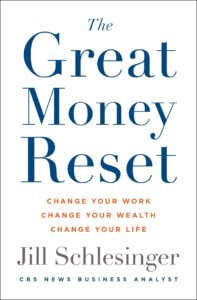
Has the pandemic prompted you to rethink, well, everything? COVID-19 has compelled many of us to consider what really matters—and what we’re no longer willing to put up with, especially when it comes to work.
We’ve all fantasized, from time to time, about making a dramatic life change, whether it’s quitting a soul-crushing job, retiring early, starting a business or ditching everything to pursue a dream. The past three years have thrown our dissatisfactions and desires into sharp relief. The world is messy and unpredictable, so why not do whatever it takes to change our lives right now?
In The Great Money Reset: Change Your Work, Change Your Wealth, Change Your Life, financial expert Jill Schlesinger offers a more measured approach, urging us to take a good, hard look at our personal finances before “blowing up” our lives, as she puts it. Through chatty prose and engrossing real-life examples (including her own career pivot from financial planner to broadcaster), she shows that a little structure and strategy can go a long way. Major life changes can be incremental rather than all-or-nothing, she says, and you can mitigate risk while you make them.
To help you get started, Schlesinger—who is also a business analyst at CBS News and host of the podcast Jill on Money—provides questions and steps for assessing your situation, spending less, renegotiating your job, investing prudently and much more. The Great Money Reset is a helpful guide for anyone who wants to reshape their life thoughtfully and sustainably.—Jaclyn Law
Harper Collins; softcover $22.99, e-book $13.99
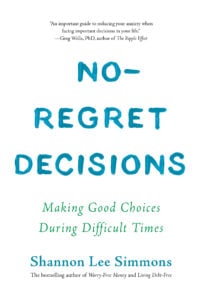
There are many ways to think about your future. But have you asked your current and future selves how you feel about it? In No-Regret Decisions, Shannon Lee Simmons writes that she had decided to not do the book during one of the many lockdowns, when both her business and childcare held massive question marks. She calmed down so she could “break the cycle of panic” and concluded that her future self would be happier if she wrote it—and kept her business running, even if her then-current self wasn’t happy about it.
Using client anecdotes and listicle-style explanations, Simmons gives clear-cut solutions at a time when it’s just too damn easy to be wishy-washy or make a regrettable choice. Told through heavy-duty real client stories, from getting divorced to being laid off, Simmons outlines how to build plans of action and get yourself in the right frame of mind to make decisions.
Her book is broken down into three parts: panic, messy and next normal (thank you, Simmons, for not calling it “the new normal”). These are the points in our lives when she says making good decisions is key, and she calls the entire approach her Decision Crisis Playbook. From each client example, she outlines how they created a plan to make calm decisions, and then she asks the reader to do the same.
Interestingly, the book challenges the idea of creating a stick-to-it-for-life financial plan. Instead, for Simmons, it’s about feeling safe in shifting your path to deal with short-term changes but still keeping a long-term goal. Her approach is like a life-coach-meets-career-coach-meets-money-coach. Simmons helps her clients, and of course her readers, to get to the real issues so that the resolution is about that and not about a panic-driven, mess-avoiding decision that will fit your future normal.—Lisa Hannam
PageTwo Books; launching May 2023
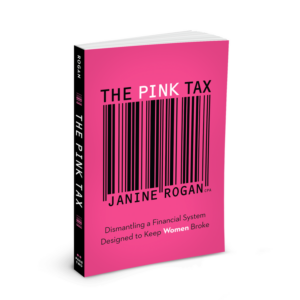
You likely already know about the “pink tax” (more on The Pink Tax book in a sec). I remember learning as a kid from my mother that my blouse was more expensive than my brother’s shirt. It’s safe to say that women pay more for stuff for no obvious reason, other than that they’re feminized goods, from drugstore buys to alcohol to dry cleaning. But the pink tax is more pervasive than just not opting for a girly-hued razor. As Janine Rogan’s book points out, women get paid less on average than men do. And don’t forget about the effects of starting a family on a woman’s salary, too, sometimes correlating with lower credit scores, higher dependency on credit and more. Rogan also talks about intergenerational financial differences as well as the lack of confidence our gender has when it comes to discussing finances. What is a woman to do today?
Each chapter is set up like the quote that starts the book: “The truth will set you free but first it will piss you off.” Their pages are loaded with info and facts to support why you should be angry that being a woman has impacted your financial situation, what we can do to change society, and where to find trusted resources to help women deal with the inequalities.
Some of the advice isn’t specific to women, such as how to pay yourself first, ensure all your investment accounts aren’t in cash, boost your credit score, automate your savings, etc. The book also delves into situations like maternity leave and its benefits, dealing with the financial impacts of divorce and domestic violence. But hopefully the eye-opening costs of being a woman will encourage readers to take action to protect their money and investments.—L.H.
Union Square & Co; softcover $23.99, e-book $8.99
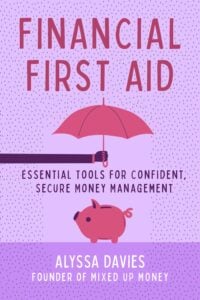
Alyssa Davies’ second book, Financial First Aid, resists the idea that emotions are best kept out of money decisions. The founder of the award-winning Mixed Up Money blog owes some of her financial success to channelling her anxiety into productive pursuits, like building emergency funds—with an “s”—and diligently saving more than she spends. These habits helped her increase her net worth from a deficit of $13,000 to a surplus of over $20,000 in assets within two years.
How can feelings of insecurity and fear play a positive role in our lives? For Davies, they are powerful motivators to plan for the inevitability of financial hiccups. “Sometimes, I consider my anxiety to be a burden,” she writes, “but financially, I’ve found a way to balance those worries, and now I view them as a sign of strength.”
Financial First Aid equips readers with tools to overcome common money emergencies, such as a sudden job loss, property damage from a natural disaster or a serious injury that forces you out of work. But it’s not just about recovering from extraordinary events. Davies believes we need backup plans for the everyday—or else an extra $100 spent on groceries in one week can be enough to set us off track.
Packed with insights and examples from Davies’ own life, Financial First Aid should be read from cover to cover. But the inclusion of chapter summaries and checklists also makes it easy to quickly reference helpful tips. This book is as much a first-aid kit in form as it is in content.—Justin Dallaire
Share this article Share on Facebook Share on Twitter Share on Linkedin Share on Reddit Share on Email